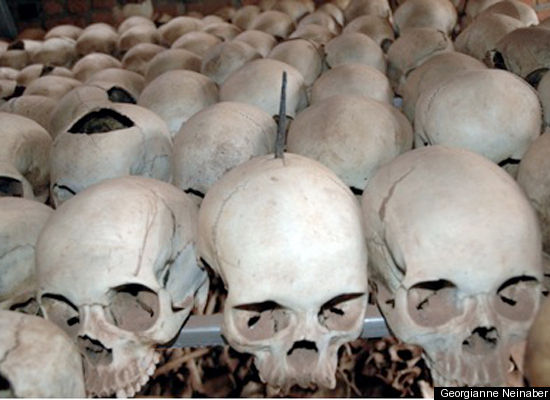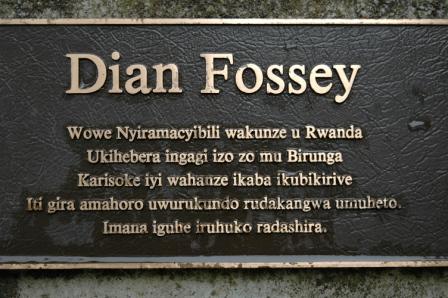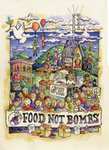In a very sad day for Rwanda, The International Crimes Tribunal for Rwanda (ICTR) announced it has overturned a 20-year sentence and acquitted Protais Zigiranyirazo, accused genocidaire and suspected murderer of American primatologist Dian Fossey. Citing "serious errors" during the 2008 trial, ICTR Chamber Judge Theodore Meron ordered the immediate release of Zigiranyirazo, known as Mr. Z. This news came at the same time that international prosecutors were meeting in Kigali, Rwanda to discuss the future of international criminal justice.
The Appeals Chamber of the International Criminal Tribunal for Rwanda, composed of Judges Theodor Meron, presiding, Mehmet Güney, Fausto Pocar, Liu Daqun, and Carmel Agius, today reversed Protais Zigiranyirazo's convictions for genocide and extermination as a crime against humanity and entered a verdict of acquittal. It then ordered his immediate release from the United Nations Detention Facility in Arusha, Tanzania.
On 18 December 2008, Trial Chamber III found Zigiranyirazo guilty of committing genocide and extermination as a crime against humanity by participating in a joint criminal enterprise to kill Tutsis at Kesho Hill in Gisenyi Prefecture on 8 April 1994 and sentenced him to two terms of 20 years of imprisonment. He was also found guilty of aiding and abetting genocide in relation to the killing of Tutsis at a roadblock in the Kiyovu area of Kigali and sentenced to one term of 15 years of imprisonment. The Trial Chamber ordered that these sentences be served concurrently.

Image: Genocide Memorial
It appears that Zigiranyirazo got off on technicalities. Judge Meron cited misstatements of law regarding the burden of proof with respect to Zigiranyirazo's alibi, and errors in the handling of evidence as rationale for his order of acquittal. The murder of Dian Fossey never entered into the equation, since it was considered a lesser crime as compared to the murder of 800,000 in Rwanda in 1994. The evidence remains overwhelming that Zigiranyirazo instituted the roadblocks in and around the city of Gisenyi and ordered the immediate execution of anyone carrying a Tutsi ID card. One can only imagine the angst the people of the province are feeling today. The survivors are mainly young people who witnessed the execution of their parents and grandparents.
Protais Zigiranyirazo was governor of Ruhengeri Province in Rwanda when Fossey worked there. Zigiranyirazo was also the brother-in-law of the Hutu President of Rwanda, Juvenal Habyarimana, whose death in an as yet unsolved plane crash ignited the Rwandan genocide of 1994. In a recent controversial ruling, a French tribunal also implicated the current President of Rwanda, Paul Kagame, in the plane crash.
Zigiranyirazo remains a likely suspect in Fossey's murder. He was involved in illegal trading in endangered species and gold smuggling out of Congo, and there is much additional evidence in the historical record that Fossey was about to expose him when she was murdered. He was also the brother-in-law of then Rwandan president Habyarimana and member of the "Akazu", a term literally meaning "a small house," the inner circle of President Habyarimana.
Shortly before Fossey's murder on December 26, 1985, the acting chargé d' affaires of the U.S. embassy in Kigali, Helen Weinland, returned to the States for some routine medical exams that took longer than necessary. It was this turn of events that left Emerson Melaven as her temporary replacement after the Christmas holiday. In early interviews with the international media, Melaven stated that he and his colleagues were impressed by the Rwandan government's response to the murder.
Helen Weinland's memoirs of those days paint a different picture. She indicates that she followed initial events surrounding the murder with some frustration that she was not back at her post in Kigali. By the time she returned very little progress had been made in the murder investigation. Weinland states unequivocally that "...it is difficult to believe that the trial to find Dian's killer was a rigorous search for the truth."
Perhaps this turn of events will propel Rwanda to institute a rigorous investigation of Fossey's murder. It may be that the murder of one will end up to be the undoing of the man who got off on a technicality for the murder of thousands.
This news might also serve as a caveat for the United States as we wrestle with the problems of the trail of Khalid Sheikh Mohammed. There is no doubt regarding the numbers of people who died on September 11, just as there is no doubt as to the carnage of 1994 in Rwanda, which has since spilled over into Congo. As Coleen Rowley indicates, there are many legal pitfalls, and if we are not careful, what we consider to be "obvious" could very well result in an acquittal.
Khalid Sheikh Mohammed's trial will undoubtedly be even more challenging for prosecutors than Moussaoui's was given the fact that Sheikh Mohammed was waterboarded 183 times and that none of his statements elicited as a result of torture will be admissible. The purely voluntary statements that Sheikh Mohammed made, however, before his capture, in April 2002, to Al Jazeera-London reporter Yosri Fouda may be used against him in court. Sheikh Mohammed's admissions which came almost a year before he was captured and tortured, are documented in Fouda's and Nick Fielding's book: Masterminds of Terror and they counterdict Dick Cheney's statements that waterboarding was essential to getting information from Sheikh Mohammed. (I happen to have met Al Jazeera reporter Yosri Fouda once in the course of an interview in November 2004 but I didn't get much of a chance to question him about his experience.)
On the day I visited the grave of Dian Fossey, raindrops covered the surface of a marker that was written in Kinyarwandan. The raindrops looked like tears.

"You Nyiramacyibili, that loved Rwanda-you gave your life to the gorillas in Virunga. This Karisoke you created has reserved for you peace and love that cannot be threatened by a spear."
As for the ongoing conflicts in the Great Lakes Region of Africa, perhaps it is the ghost of Dian Fossey that will generate interest in a rigorous search for the truth. Perhaps outrage at the death of one will put the deaths of 3000 at the Twin Towers, 800,000 in Rwanda and six million in Congo into perspective.












4 comments:
Georgianne....wI hope that justice wins. Thanks so much for your in depth reporting.
Hi..its is good to be back here. It has been quite the year of trying to follow up on all of the sadness coming out of Africa and I almost forgot what a wonderful space Mosquito is...hoping to spend some more time here.
We are thrilled anytime you bless this space with your investigative reporting. It is so rare.
BTW, I hope you have time to check out Floydfest. We'd love to have you check out our musical wonderland in the blue ridge mountains. :) :)
Keep me posted!
Post a Comment